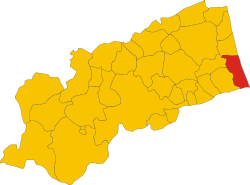San Benedetto del Tronto
| San Benedetto del Tronto | ||
|---|---|---|
| Comune | ||
| Città di San Benedetto del Tronto | ||

San Benedetto del Tronto seafront - fountain in Giorgini Square
|
||
|
||
 San Benedetto within the Province of Ascoli |
||
| Location of San Benedetto del Tronto in Italy | ||
| Coordinates: 42°57′N 13°53′E / 42.950°N 13.883°ECoordinates: 42°57′N 13°53′E / 42.950°N 13.883°E | ||
| Country | Italy | |
| Region | Marche | |
| Province / Metropolitan city | Ascoli Piceno (AP) | |
| Frazioni | Porto d'Ascoli | |
| Government | ||
| • Mayor | Pasqualino Piunti (FI) | |
| Area | ||
| • Total | 25 km2 (10 sq mi) | |
| Elevation | 7 m (23 ft) | |
| Population | ||
| • Total | 48,700 | |
| • Density | 1,900/km2 (5,000/sq mi) | |
| Demonym(s) | Sambenedettesi | |
| Time zone | CET (UTC+1) | |
| • Summer (DST) | CEST (UTC+2) | |
| Postal code | 63074, 63037 | |
| Dialing code | 0735 | |
| Patron saint | St. Benedict the Martyr | |
| Website | Official website | |
San Benedetto del Tronto (Sambenedèttë in the local dialect) is a city and comune in the province of Ascoli Piceno, Marche, Italy. Its population is 50,000 making it the second most populous city in the province. It lies on the coast of the Adriatic Sea and is an active fishing port and one of the main seaside resorts on the central Adriatic coast. Located at the mouth of the river Albula, its territory extends to the river Tronto in the south.
San Benedetto del Tronto was a martyr and a soldier born in Cupra during the reign of Roman Emperor Diocletian. Shortly thereafter, following the edict of Constantine in 313 AD, some believers built a chapel around the tomb. Since then, San Benedetto has been highly revered by locals. He later built a small church which included an apse facing the east and its entrance facing the west, in accordance with the early Christian tradition that the east, where the sun rises, and the sunrise is symbolic of Christ's resurrection. Historians argue that archaeological findings indicate Roman origins, linking San Benedetto to the ancient city of Alba Picena on the right bank of the Albula river.
The first document which indicated the name of the village dates from 998. The document was an act concerning the investiture of the benefice of SS. Vincent and Anastasius in the territory of Acquaviva Piceno by Hubert bishop of Fermo. The document contains the phrase "Pede sive terra et silva Sancti Benedicti", referring to the city. In 1211, Emperor Otto IV granted the territories ranging from the Tronto River to the Potenza river to the town of Fermo. In 1245, Emperor Frederick II granted Ascoli Piceno a stretch of coast between the Ragnola river and Tronto river to build a fortified port. In the following years, there were disputes between Ascoli and Fermo. In 1478, there was a plague epidemic which decimated the city's population. The area remained virtually uninhabited until refugees from Romagna repopulated San Benedetto where they were granted land leases. From the 16th century until the 19th century, the Turks repeatedly invaded the city where they captured sailors and forced them into slavery. Since 1650, the urban center expanded beyond the city walls. In 1754, the first marine suburbs, Sant'Antonio da Padova and Marina, were created. In 1860, the "Cacciatori delle Alpi" freed the city from the dominion of the church. The Royal Decree giving San Benedetto the "del Tronto" attribute was in 1896. In 1936, the village of Porto d'Ascoli was absorbed into the city of San Benedetto del Tronto.
...
Wikipedia


